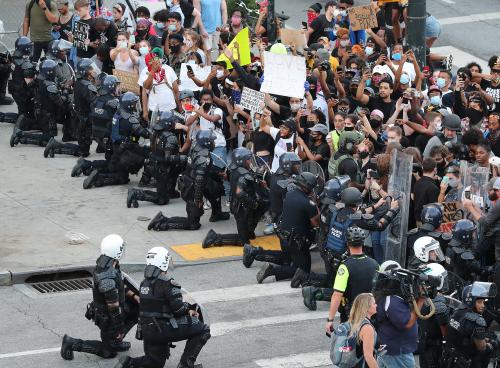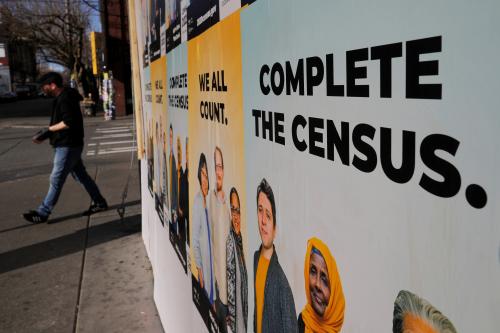If ever there were a singular moment for the Executive Branch to advance racial justice, it is now. With demonstrations continuing around the country to mourn the brutal murder of George Floyd, it will be both politically and morally imperative for whomever assumes the Presidency in January of 2021 to have a well-defined strategy to answer this moment.
Our collective national grief is about the ways in which Black and Brown potential has been squandered, repressed, and dismissed. Is it possible for a White House to answer a moment like this, where the need and demand for equity and justice are so deafening? The answer is yes.
President Lyndon Johnson’s Great Society program, much of which was passed by Congress in 1965, was borne of a similar, rending moment. In June of 1963, NAACP field secretary Medgar Evans was assassinated in Jackson, Mississippi. In August of that year, the historic March on Washington for Jobs and Freedom, that will be forever be associated with Reverend Dr. Martin Luther King, Jr.’s I have a Dream speech, took place. And later that year, in November of 1963, President Kennedy was assassinated in Dallas, Texas.
President Johnson used a combination of rapid development of proposals, plus expert legislative maneuvering that capitalized on Democratic majorities in both the House and Senate to enact the Great Society legislation. Many Americans today take for granted the protections—such as the federal minimum wage and social safety net programs, such as Medicare and Medicaid—that were prioritized by the Johnson White House.
What can we learn from this? Johnson was able to get the Great Society legislation passed, in large part, because he formulated and pursued an intentional and coherent economic justice policy agenda that could be achieved within the two-year Congressional election calendar.
In 2021, an Executive Branch strategy to move quickly on racial justice and inequality should include both legislative and federal agency components.
How would the President identify and prioritize critical areas for attention and investment? The President should appoint a non-partisan and independent Federal Equity Commission whose remit is to make recommendations to the President and his staff, marshal the data upon which the Executive Branch can make decisions about the issues it wishes to pursue, liaison with each agency to identify agencies’ authorities that can be intentionally trained on remedying the impacts of racism, and interface with the National Economic Council and agency heads on fiscal priorities relevant to eradicating the impact of racism. Ideally, that Federal Equity Commission would be appropriated in a manner that provides insulation from the biennial cycle of Congressional elections.
Once the Commission has started to develop recommendations for specific policy actions to address racial injustice, the President ,his staff, and Congressional leaders would craft a substantive legislative agenda that can be enacted by November 2022.
What should be on the agenda? The 2021 White House should prioritize jobs and income for communities of color, a risk-based framework for reforming policing tactics, investment in Black and Brown neighborhoods and in well-being—thus eliminating deserts in health care and financial services and incentivizing education metrics that measure the degree to which Black and Brown students perceive themselves to be valued in the school environment.
In addition, the White House should use the Commission’s recommendations to direct agencies to utilize their full authorities in support of racial justice. In particular, the President should move to resuscitate the powers of the Justice Department to review the conduct of police departments across the country.
The 2021 White House should also not shy away from engaging with regulators, particularly the FCC and the financial services regulators, to explore the expansion or modification of the FCC-mandated basic internet program and in the case of the financial services regulators, the ways in which these regulators can promote responsible access to credit in an effort to address the current and yawning, racial wealth gap in the U.S.
It’s tough political work to eradicate racial disparities and racism. Still, anybody who enters 1600 Pennsylvania Ave in January of 2021 should be reflecting on how George Floyd’s murder confirmed the bitter truth that there are two Americas—one where the American dream is a reality and the other, where about 1 in 1,000 black men and boys in America can expect to die at the hands of police.
We need a proactive and strategic 2021 White House that can own the responsibility of getting us closer to one America, one where we are each valued and belong.





Commentary
Racism and the task ahead for the 2021 White House
June 11, 2020